Search Result
Results for "
Wnt/β-catenin signal inhibitor
" in MedChemExpress (MCE) Product Catalog:
| Cat. No. |
Product Name |
Target |
Research Areas |
Chemical Structure |
-
- HY-115539
-
|
|
Wnt
β-catenin
Histone Acetyltransferase
|
Cancer
|
|
Windorphen is a Wnt/β-catenin signal inhibitor that specifically targets the function of the c-terminal transactivation domain of β-catenin-1 but not β-catenin-2. Windorphen selectively targets p300, disrupting the association of the mammalian β-catenin with p300 but not CBP .
|
-
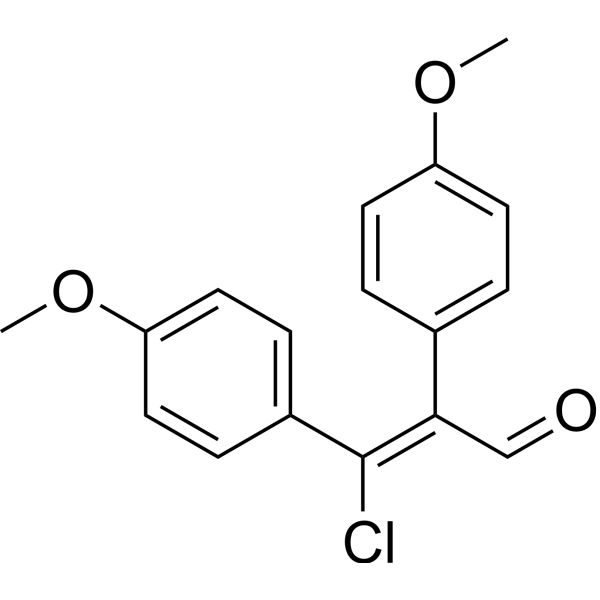
-
- HY-120697
-
|
|
Wnt
β-catenin
|
Cancer
|
|
MSAB is a potent and selective inhibitor of Wnt/β-catenin signaling. MSAB binds to β-catenin promoting its degradation, and specifically downregulates Wnt/β-catenin target genes. MSAB exhibits potent anti-tumor effects selectively on Wnt-dependent cancer cells .
|
-
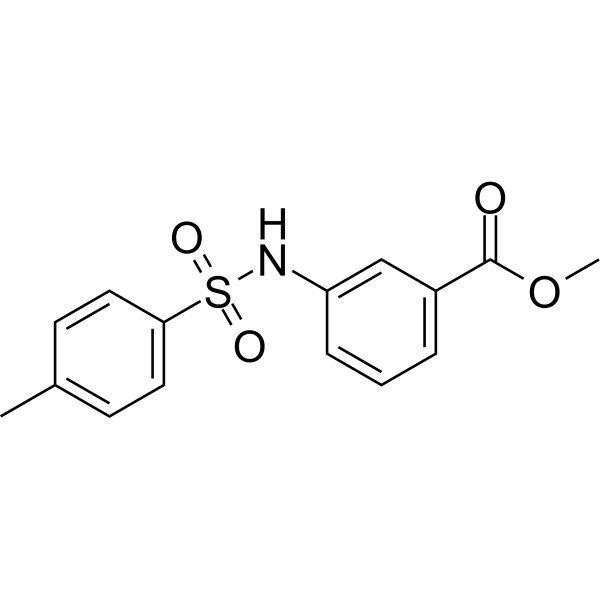
-
- HY-121118
-
-
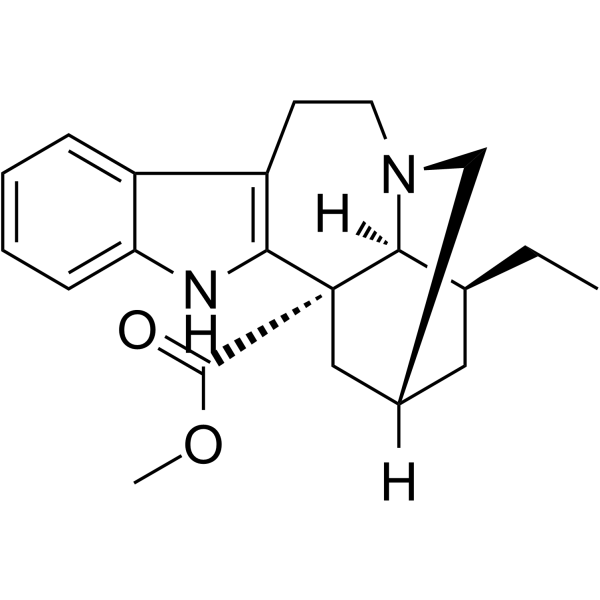
-
- HY-160489
-
|
|
β-catenin
|
Cancer
|
|
PTK7/β-catenin-IN-2 (compound 04967) is an inhibitor of PTK7/β-catenin. It inhibits the binding of PTK7 to β-catenin (IC50: 5.6 μM), thereby inhibiting the signaling of the Wnt/β-catenin pathway. PTK7/β-catenin-IN-2 targets cell growth dependent on the Wnt signaling pathway and has anticancer properties. PTK7/β-catenin-IN-2 also showed inhibitory potency against p53 and MDM2 binding with an IC50 of 157.1 μM .
|
-
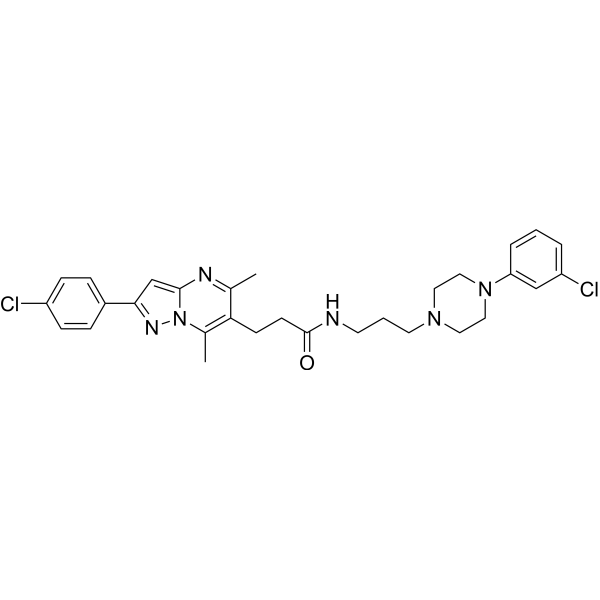
-
- HY-160493
-
|
|
Wnt
β-catenin
|
Cancer
|
|
PTK7/β-catenin-IN-6 (Compound 03653) is an inhibitor for PTK7/β-catenin interaction, which inhibits the Wnt signaling pathway, and exhibits an anticancer activity against colorectal cancer (CRC) .
|
-
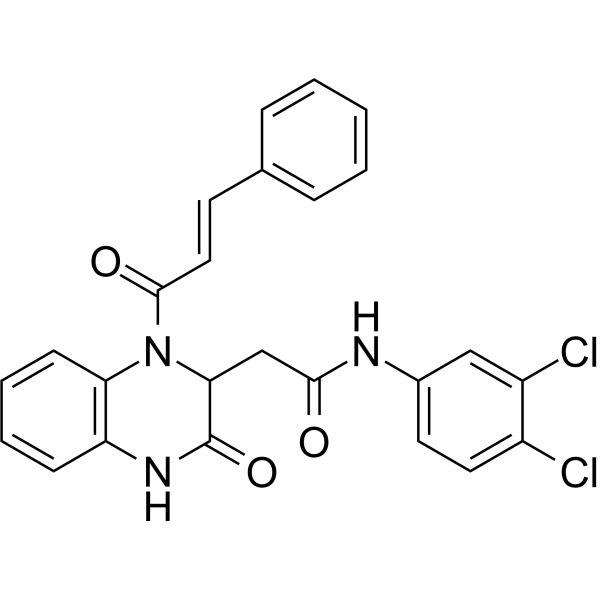
-
- HY-13815
-
KY02111
5 Publications Verification
|
Wnt
|
Cardiovascular Disease
|
|
KY02111 is a canonical WNT signaling (β-catenin) inhibitor which promotes differentiation of hPSCs to cardiomyocytes. KY02111 can be used for the research of human cardiomyocyte regeneration .
|
-
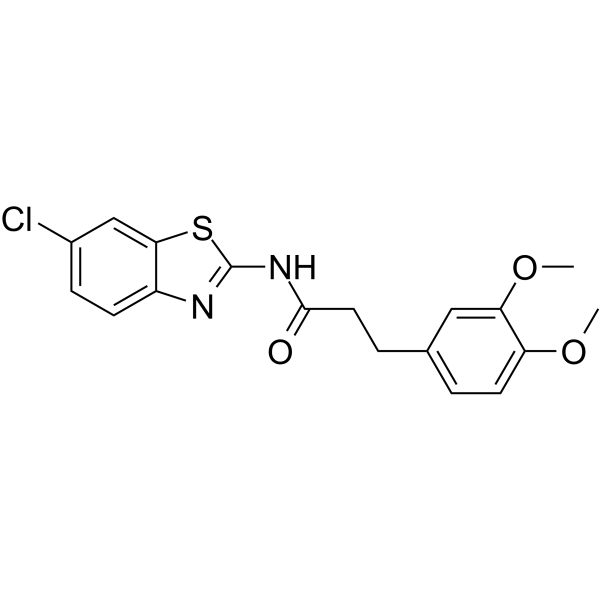
-
- HY-163409
-
|
|
β-catenin
|
Inflammation/Immunology
Cancer
|
|
CKG012 is an inhibitor for Wnt/βcatenin signaling pathway. CGK012 inhibits release of HMGB1 and transcription of β-catenin, exhibits attenuating activities against cecal ligation and puncture (CLP)-induced sepsis and multiple myeloma cancer .
|
-
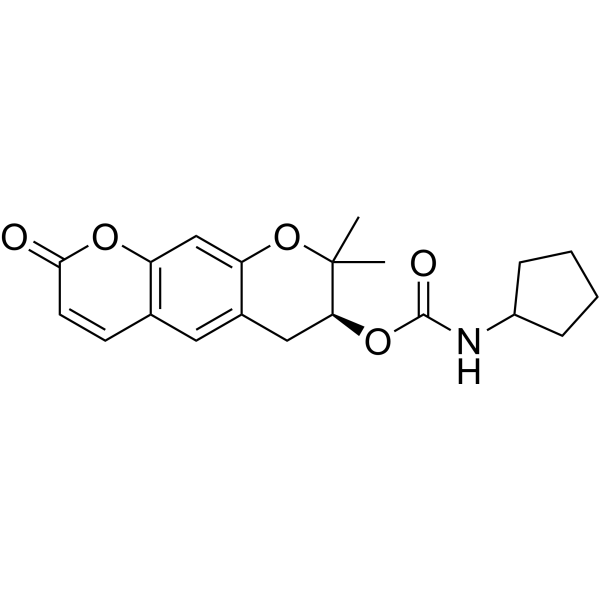
-
- HY-112799
-
|
|
Wnt
β-catenin
|
Cancer
|
|
DK419 is a potent and orally active Wnt/β-catenin signaling inhibitor, with an IC50 of 0.19 μM. DK419 reduces protein lelvels of Axin2, β-catenin, c-Myc, Cyclin D1 and Survivin and induces production of pAMPK .
|
-
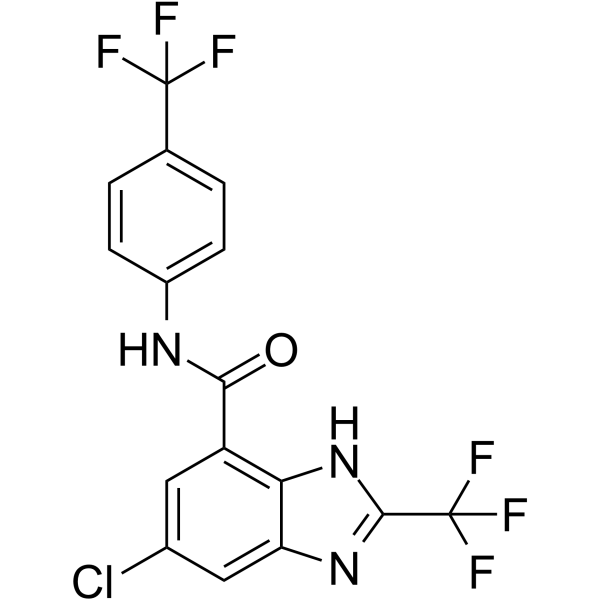
-
- HY-133180
-
|
|
Wnt
β-catenin
|
Metabolic Disease
|
|
YW1128 (compound 3a) is a potent Wnt/β-Catenin inhibitor. YW1128 induces the proteasome degradation of β-catenin and subsequent inhibits the Wnt/β-catenin signaling in cells. YW1128 significantly decreases hepatic lipid accumulation. YW1128 improves glucose tolerance of high fat diet-fed mice without noticeable toxicity. YW1128 down regulates the genes involved in the glucose and fatty acid anabolism .
|
-
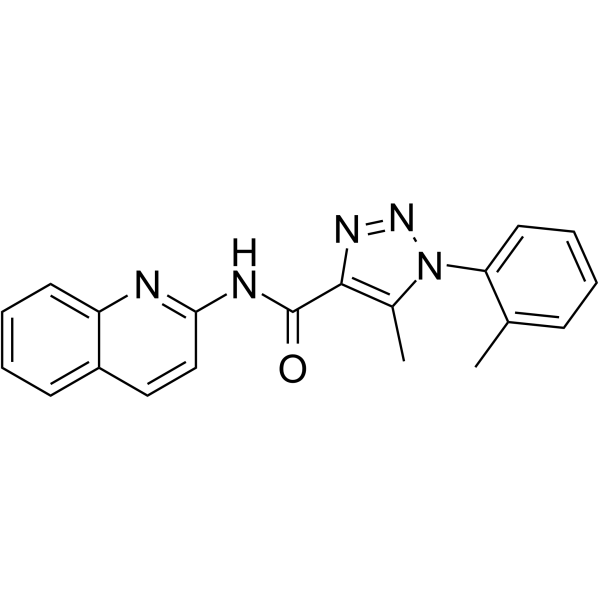
-
- HY-18959
-
|
|
|
|
|
CWP232228, a highly potent selective Wnt/β-catenin signaling inhibitor, antagonizes binding of β-catenin to T-cell factor (TCF) in the nucleus. CWP232228 suppresses tumor formation and metastasis without toxicity through the inhibition of the growth of breast and liver cancer stem cells (CSCs) .
|
-
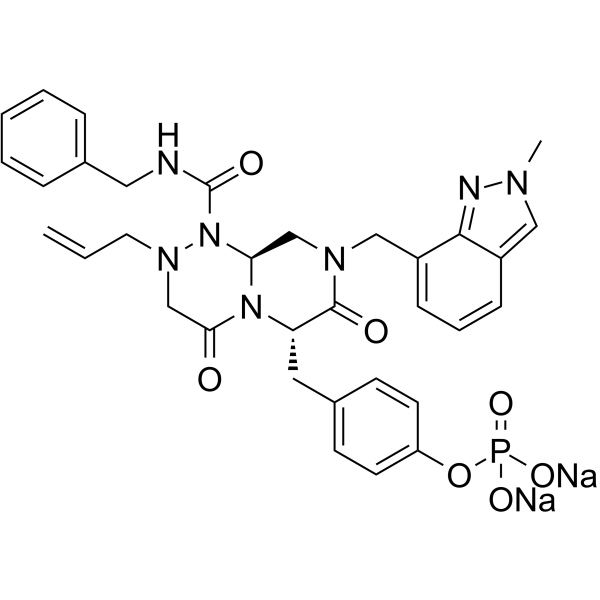
-
- HY-108442
-
JW67
1 Publications Verification
|
Wnt
|
Cancer
|
|
JW67 inhibits the canonical Wnt signaling with an IC50 of 1.17μM . JW67 affects the multiprotein complex consisting of β-catenin/GSK-3β/AXIN/APC/CK1 that rapidly reduces active β-catenin with a subsequent downregulation of Wnt target genes. JW67 also inhibits colorectal cancer cell growth .
|
-
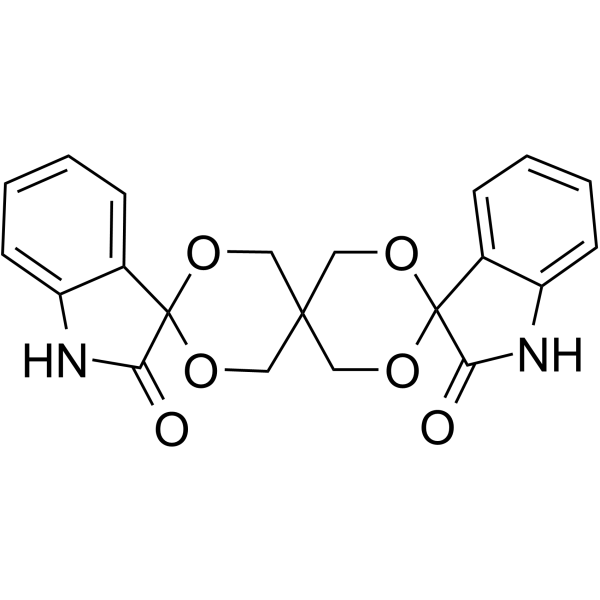
-
- HY-160709
-
|
|
Wnt
β-catenin
|
Cancer
|
|
Wnt/β-catenin-IN-2 (Compound 3235-0367) is a Wnt/β-catenin signaling pathway inhibitor, with IC50 and KD values of 7.1 and 2.5 μM, respectively. Wnt/β-catenin-IN-2 can be used for the research of cancer .
|
-
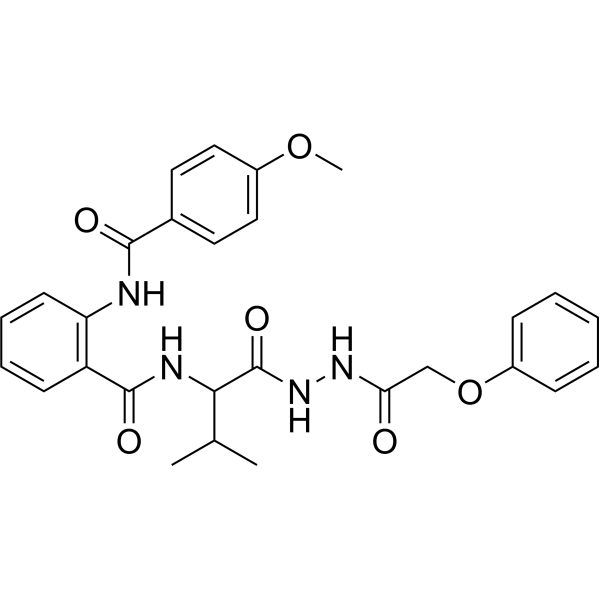
-
- HY-138301
-
|
DS37262926
|
β-catenin
|
Cancer
|
|
Miclxin (DS37262926) is a potent inhibitor of mutant β-catenin, involving in Wnt signaling pathway. Miclxin induces β-catenin-dependent apoptosis, leads to severe mitochondrial damage with the loss of mitochondrial membrane. Miclxin kills tumor via targeting to MIC60, a major components of the mitochondrial contact site and cristae organizing system (MICOS) complex .
|
-
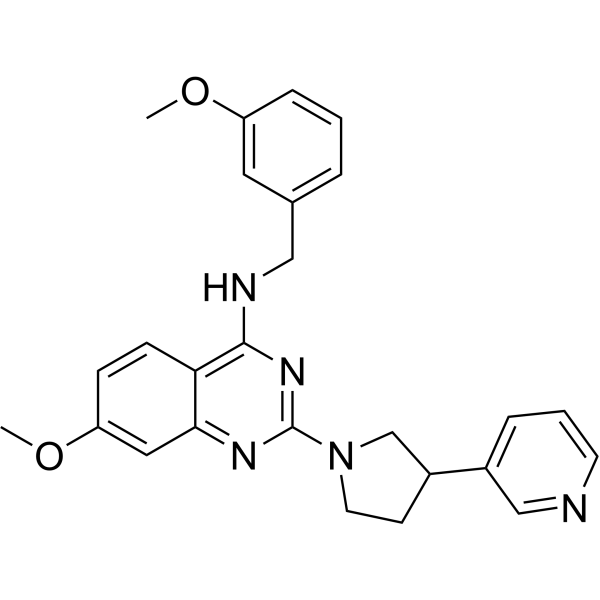
-
- HY-157990
-
|
|
Wnt
β-catenin
|
Cancer
|
|
Wnt/β-catenin-in-1 (compounds 17) is a Wnt/β-catenin signaling pathway inhibitor. Wnt/β-catenin-IN-1 can induce apoptosis of colon cancer cells, has broad-spectrum anticancer activity, and can be used for the reseach of a variety of solid tumors .
|
-
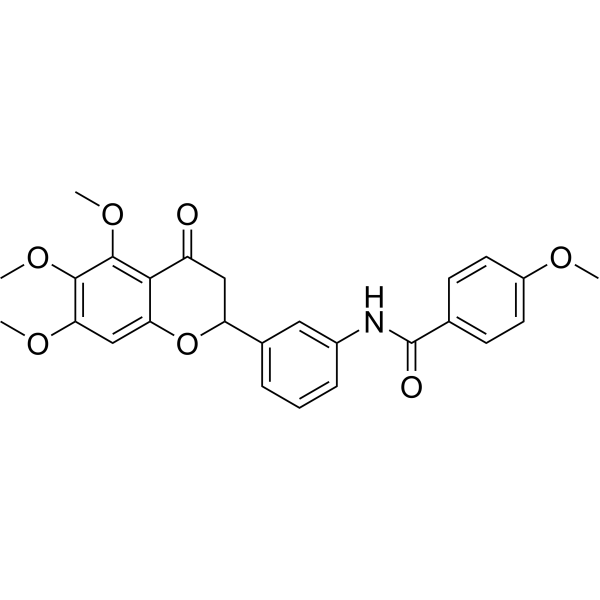
-
- HY-155391
-
|
|
Carbonic Anhydrase
P-glycoprotein
Wnt
β-catenin
|
Cancer
|
|
hCA/Wnt/β-catenin-IN-1 (Compd 15) is an inhibitor of hCA (Ki: 33.6, 24.1, 6.8 nM for hCA II, hCA IX, hCA XII). hCA/Wnt/β-catenin-IN-1 reduces P-gp activity. hCA/Wnt/β-catenin-IN-1 also inhibits Wnt/β-catenin signaling pathway. hCA/Wnt/β-catenin-IN-1 inhibits cancer cell viability, including the NCI/ADR-RES DOX-resistant cell line .
|
-
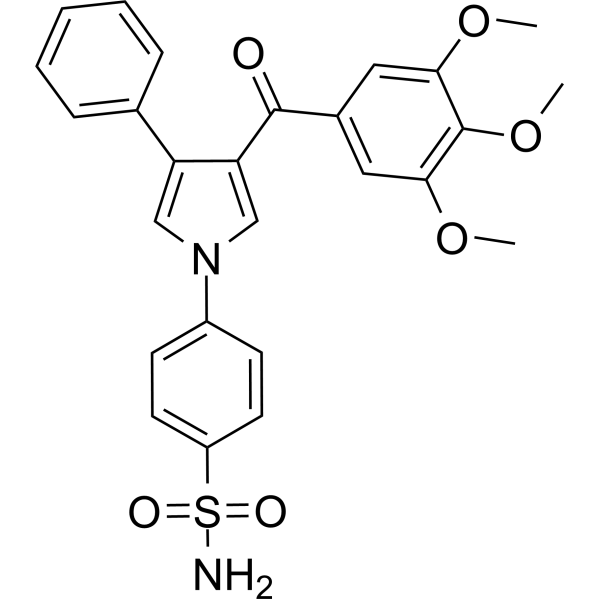
-
- HY-12238
-
|
endo-IWR 1; IWR-1-endo
|
Organoid
Wnt
|
Cancer
|
|
IWR-1 is a tankyrase inhibitor which inhibits Wnt/β-catenin signaling pathway.
|
-
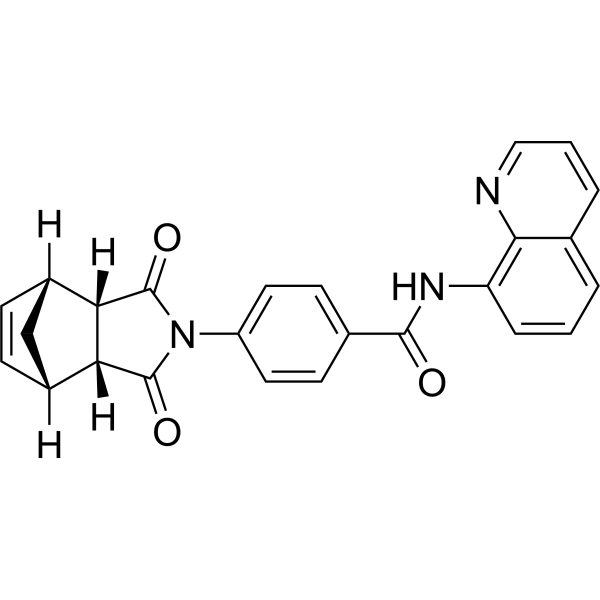
-
- HY-16910
-
WIKI4
2 Publications Verification
|
PARP
β-catenin
|
Cancer
|
|
WIKI4 is a potent tankyrase inhibitor with an IC50 of 26 nM for TNKS2. WIKI4 potently inhibits Wnt/β-catenin signaling and that its half-maximal response dose is 75 nM. WIKI4 mediates its effects on Wnt/β-catenin signaling by inhibiting the enzymatic activity of TNKS2 . WIKI4 is cytotoxic to SCLC cells with an IC50 value of 0.02 μM .
|
-
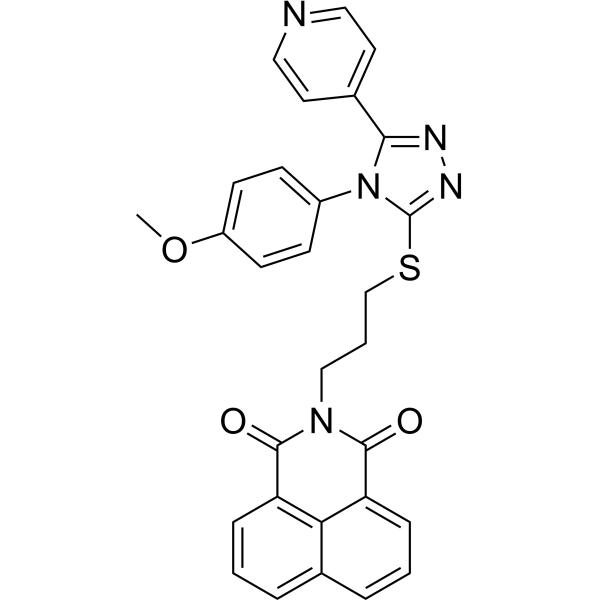
-
- HY-137454
-
|
|
Wnt
β-catenin
|
Inflammation/Immunology
|
|
Teplinovivint is a potent wnt/β-catenin signaling pathway inhibitor. Teplinovivint has anti-inflammatory activity and has the potential for tendinopathy research .
|
-
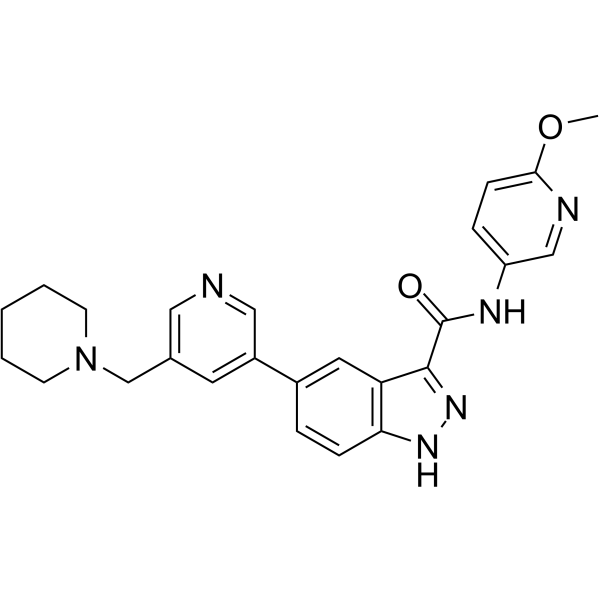
-
- HY-115543
-
|
|
β-catenin
|
Cancer
|
|
β-catenin-IN-37 is a selective β-Catenin/T-cell factor protein-protein interaction (β-catenin/Tcf PPI) inhibitor. β-catenin-IN-37 inhibits canonical Wnt signaling and the growth of colorectal cancer cells SW480 and HCT116 with the IC50 values of 20 μM and 31 μM, respectively .
|
-
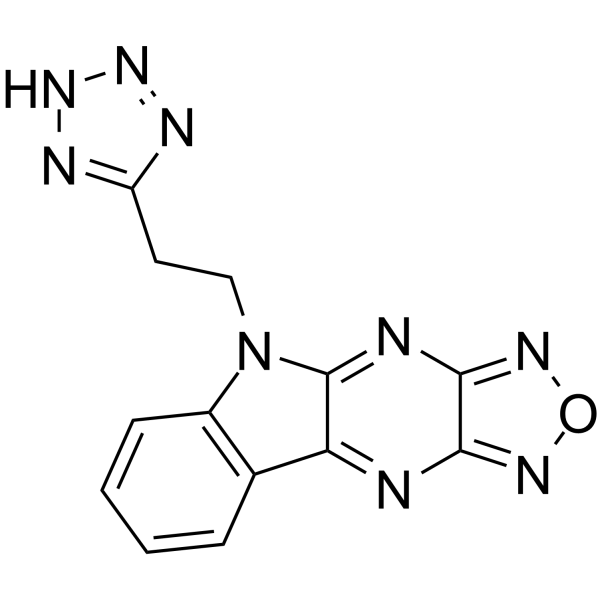
-
- HY-111460
-
|
NC 043
|
Wnt
|
Cancer
|
|
15-Oxospiramilactone is a diterpene derivative. 15-Oxospiramilactone can inhibit Wnt/β-catenin signaling and tumorigenesis of colon cancer cells .
|
-
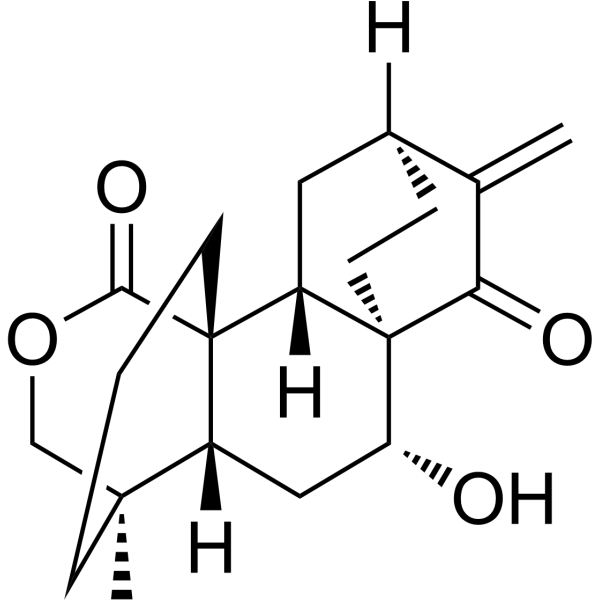
-
- HY-145267
-
|
|
PARP
Wnt
|
Cancer
|
|
OM-153 is a potent and orally active tankyrase inhibitor with IC50s of 13 nM and 2 nM for tankyrase 1 and tankyrase 2 (TNKS1/2), respectively. OM-153 inhibits luciferase-based Wnt/β-catenin signaling reporter activity with an IC50 value of 0.63 nM. OM-153 shows inhibition of Wnt/β-catenin signaling and proliferation in COLO 320DM .
|
-
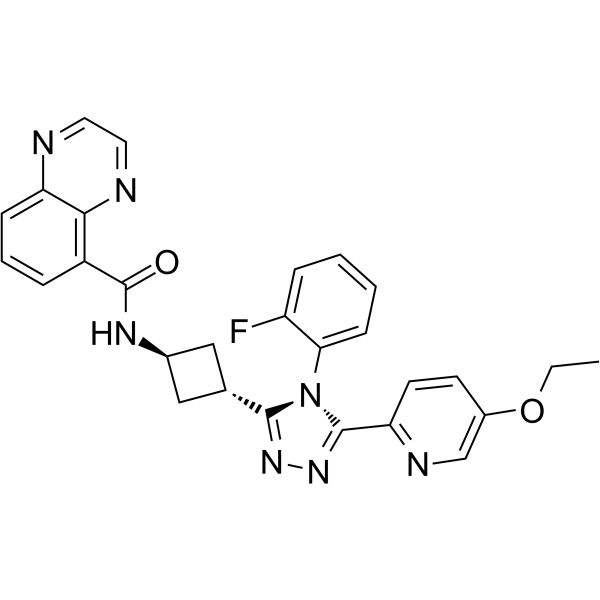
-
- HY-153214
-
|
|
Wnt
β-catenin
|
Cancer
|
|
YW2036 (compound 2a) is a potent Wnt/β-Catenin signaling pathway inhibitor with an IC50 value of 637 nM. YW2036 can be used in research of cancer .
|
-
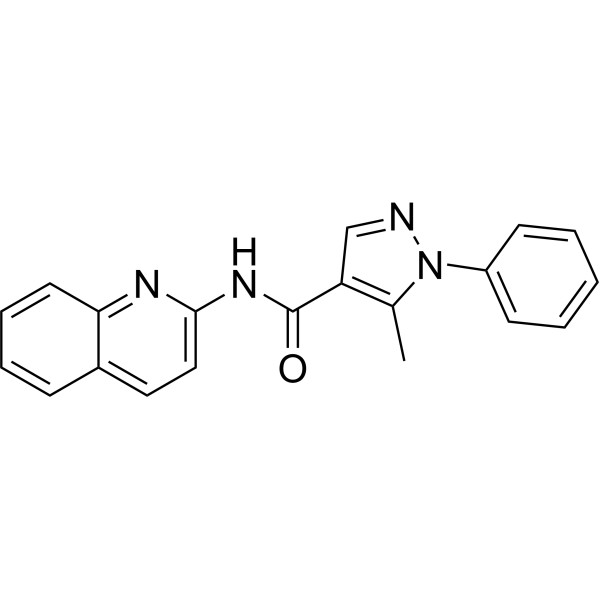
-
- HY-108441
-
|
|
β-catenin
|
Cancer
|
|
CCT 031374 hydrobromid is a potent inhibitor of β-catenin/transcription factor (TCF) complex signaling. CCT031374 inhibits TCF-dependent transcription of genes of Wnt signaling pathway. CCT 031374 has antitumor activity .
|
-
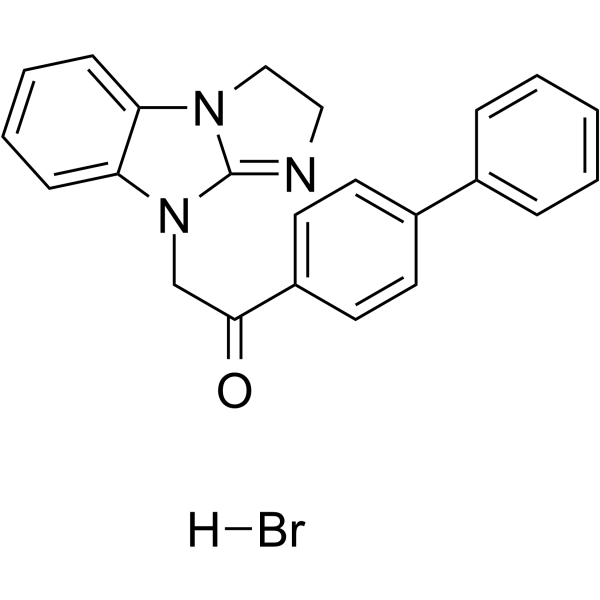
-
- HY-N0020
-
|
|
Wnt
Reactive Oxygen Species
|
Neurological Disease
|
|
Echinacoside, one of the phenylethanoids isolated from the stems of Cistanche deserticola, effectively inhibits Wnt/β-catenin signaling. Echinacoside elicits neuroprotection by activating Trk receptors and their downstream signal pathways. Antiosteoporotic activity .
|
-
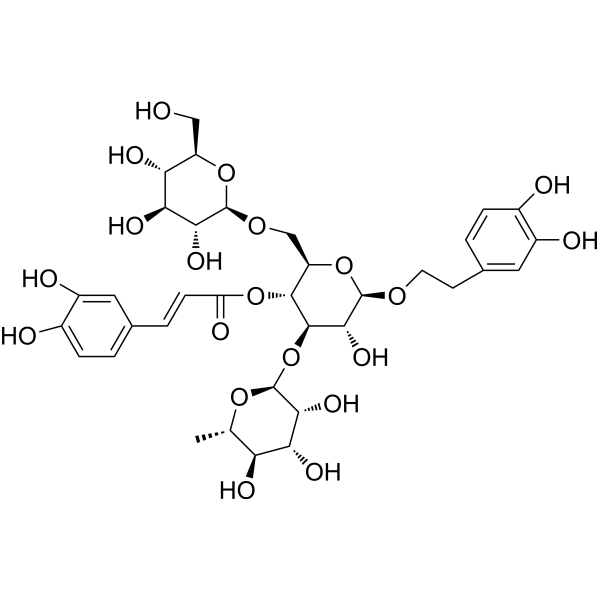
-
- HY-117233
-
|
|
β-catenin
Wnt
|
Metabolic Disease
Cancer
|
|
UU-T02 is a novel potent, selective small-molecule inhibitor of β-Catenin/T-cell factor protein-protein interaction (β-catenin/Tcf PPI) with a Ki of 1.36 μM . UU-T02 inhibits canonical Wnt signaling and the growth of colorectal cancer cells .
|
-
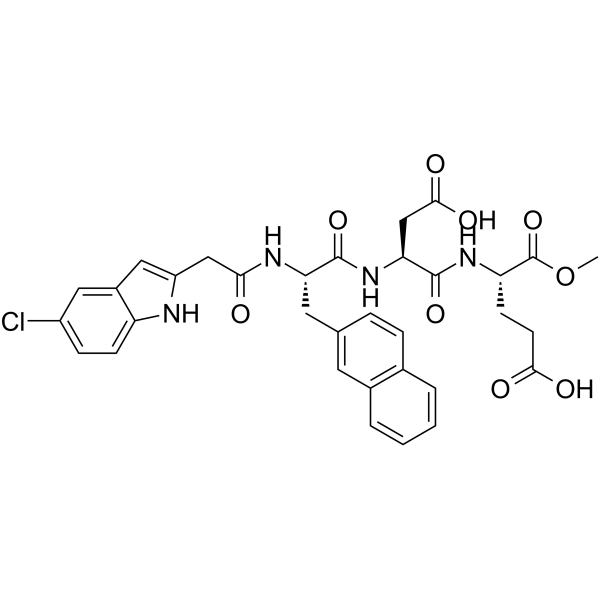
-
- HY-17439
-
|
Salinomycin sodium; Sodium salinomycin
|
Wnt
β-catenin
Bacterial
Autophagy
Apoptosis
Antibiotic
Parasite
|
Cancer
|
|
Salinomycin sodium salt (Salinomycin sodium), an antibiotic potassium ionophore, is a potent inhibitor of Wnt/β-catenin signaling. Salinomycin sodium salt (Salinomycin sodium) acts on the Wnt/Fzd/LRP complex, blocks Wnt-induced LRP6 phosphorylation, and causes degradation of the LRP6 protein. Salinomycin sodium salt (Salinomycin sodium) shows selective activity against human cancer stem cells .
|
-
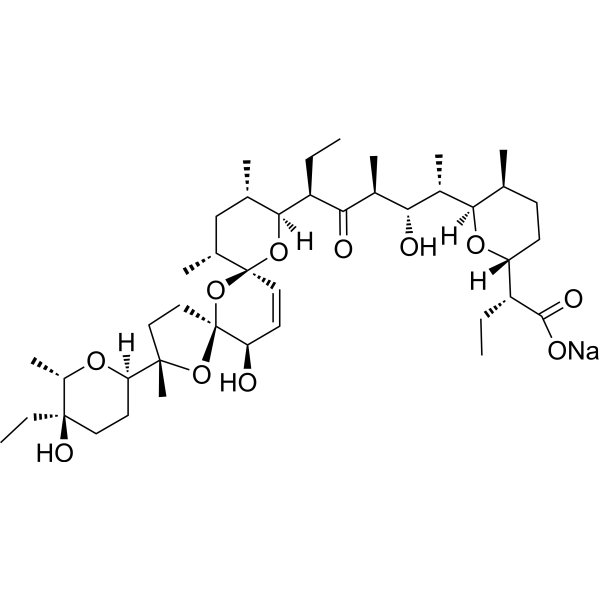
-
- HY-15597
-
|
Procoxacin
|
Bacterial
Wnt
β-catenin
Mitophagy
Autophagy
Apoptosis
Antibiotic
Parasite
|
Cancer
|
|
Salinomycin (Procoxacin), a polyether potassium ionophore antibiotic, selectively inhibits the growth of gram-positive bacteria. Salinomycin is a potent inhibitor of Wnt/β-catenin signaling, blocks Wnt-induced LRP6 phosphorylation. Salinomycin (Procoxacin) shows selective activity against human cancer stem cells .
|
-
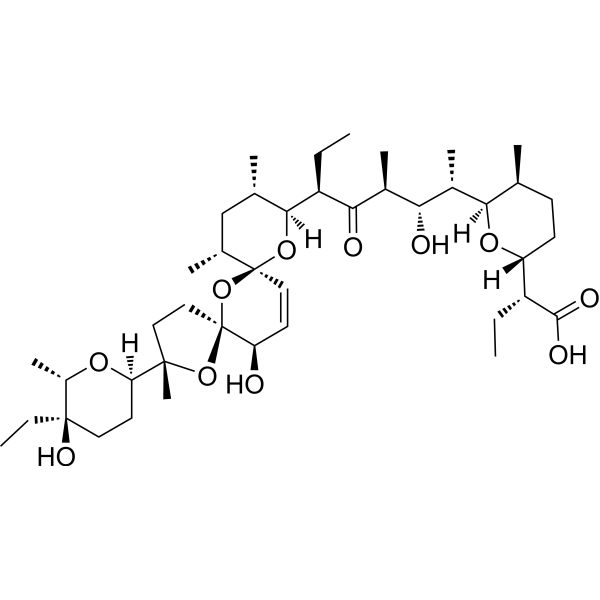
-
- HY-W010995
-
|
|
Wnt
Survivin
β-catenin
|
Cancer
|
|
2,5-Dimethylcelecoxib is an analogue of celecoxib (HY-14398) with anticancer activity but without COX-2 inhibitory activity. 2,5-Dimethylcelecoxib exerts its anti-cancer cell proliferation effect by inhibiting the core mechanism of the Wnt/β-catenin signaling pathway. 2,5-Dimethylcelecoxib also inhibits T-cell factor-dependent transcriptional activity and inhibits expression of the Wnt/β-catenin target gene products cyclin D1 and survivin .
|
-
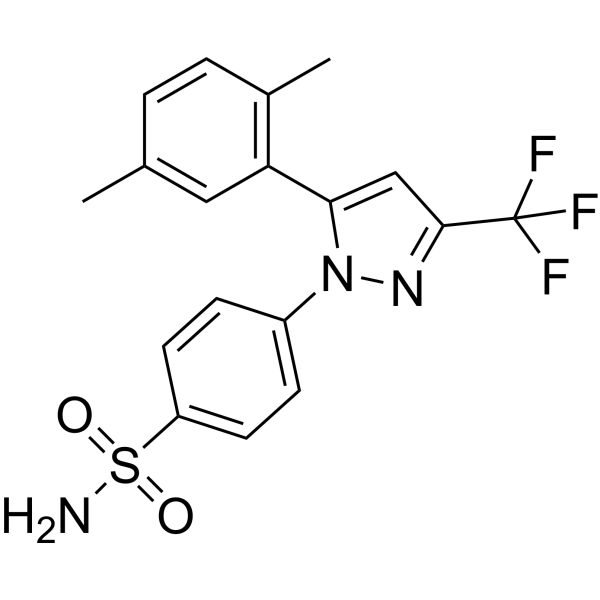
-
- HY-141891
-
|
|
E1/E2/E3 Enzyme
|
Cancer
|
|
M435-1279 is a UBE2T inhibitor. M435-1279 inhibits the Wnt/β-catenin signaling pathway hyperactivation through blocking UBE2T-mediated degradation of RACK1 .
|
-
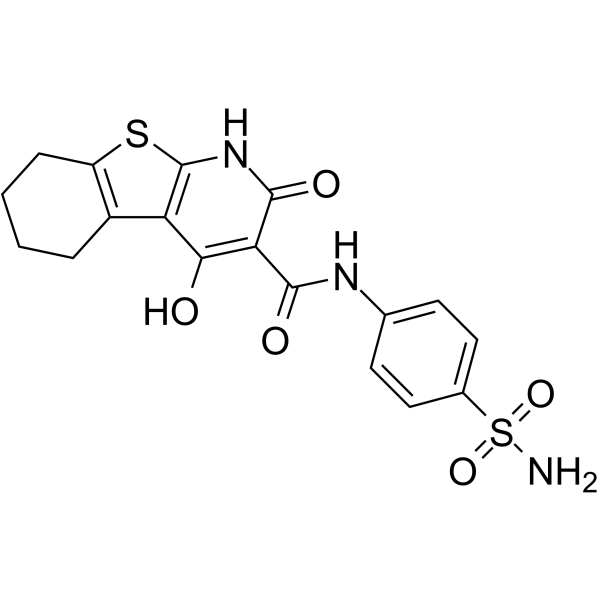
-
- HY-18285
-
|
|
Casein Kinase
ERK
CDK
|
Cancer
|
|
Longdaysin is a inhibitor of the Wnt/β-catenin signaling pathway, which exerts antitumor effect through blocking CK1δ/ε-dependent Wnt signaling. Longdaysin inhibits CK1α, CK1δ, CDK7, and ERK2 with IC50s of 5.6 µM, 8.8 µM, 29 µM, and 52 µM, respectively .
|
-
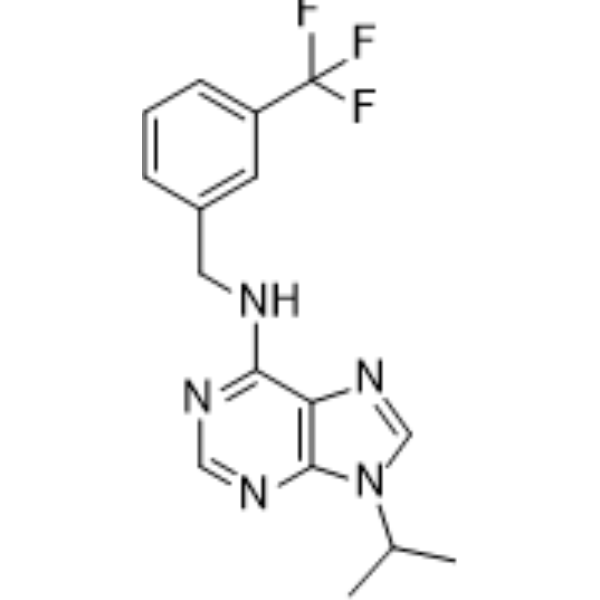
-
- HY-108437
-
|
|
Wnt
|
Infection
Cancer
|
|
exo-IWR-1, an inactive stereoisomer of Endo-IWR-1, is a negative control of IWR-1 (HY-12238). IWR-1 is a tankyrase inhibitor which inhibits Wnt/β-catenin signaling pathway .
|
-
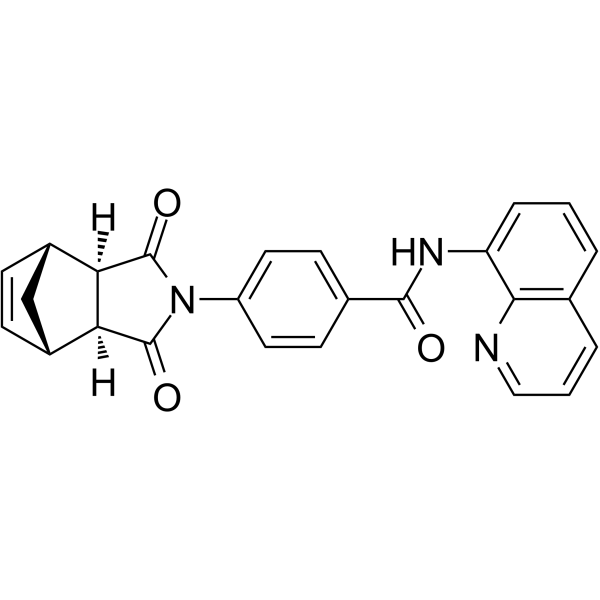
-
- HY-151463
-
|
|
CDK
β-catenin
|
Cancer
|
|
CDK8-IN-11 is a potent and selective CDK8 inhibitor with an IC50 value of 46 nM. CDK8-IN-11 inhibits WNT/β-catenin signaling pathway. CDK8-IN-11 can be used in the research of colon cancer .
|
-
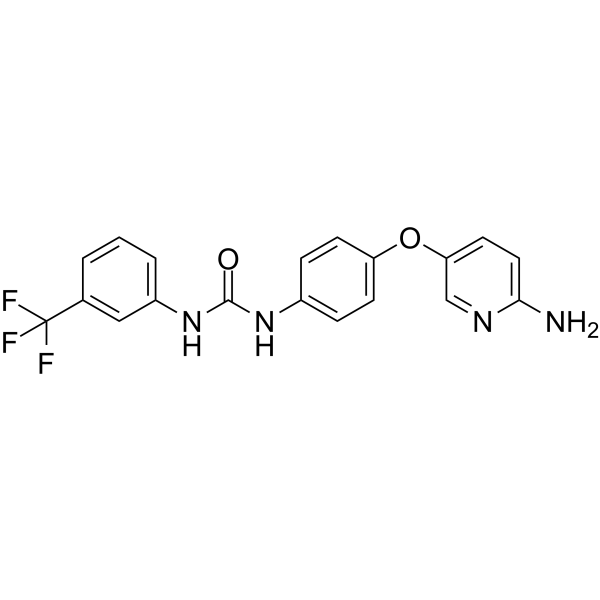
-
- HY-151463A
-
|
|
CDK
β-catenin
|
Cancer
|
|
CDK8-IN-11 hydrochloride is a potent and selective CDK8 inhibitor with an IC50 value of 46 nM. CDK8-IN-11 hydrochloride inhibits WNT/β-catenin signaling pathway. CDK8-IN-11 hydrochloride can be used in the research of colon cancer .
|
-
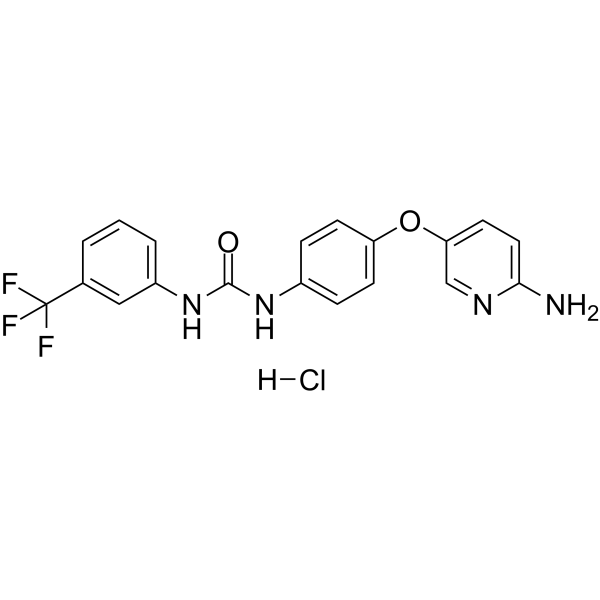
-
- HY-119711
-
|
|
MMP
|
Cancer
|
|
NNGH is a stromelysin-1 (MMP-3) inhibitor. MMP-3 is both a direct transcriptional target and a necessary contributor of the Wnt/β-catenin signaling pathway. Matrix metalloproteinases (MMPs) play a well-defined role in later stages of tumor progression .
|
-
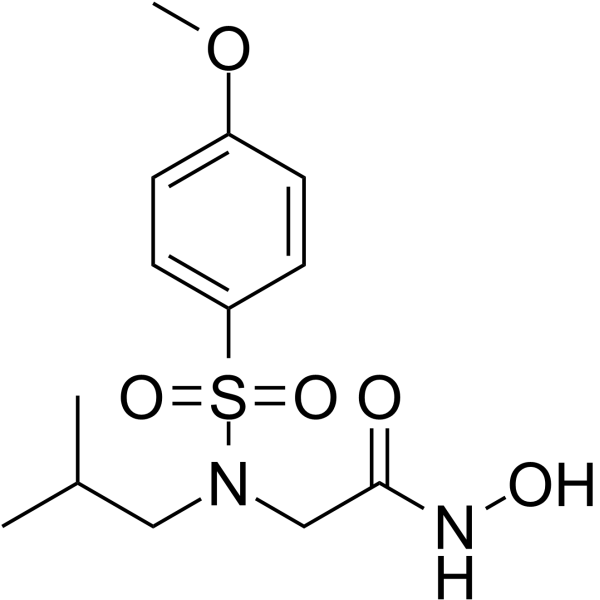
-
- HY-P2272
-
|
|
Wnt
β-catenin
|
Cancer
|
|
NLS-StAx-h is a selective, cell permeable, stapled peptide Wnt signaling inhibitor with an IC50 of 1.4 μM. NLS-StAx-h efficiently inhibits β-catenin-transcription factor interactions. NLS-StAx-h shows anti-proliferation of cancer cells .
|
-
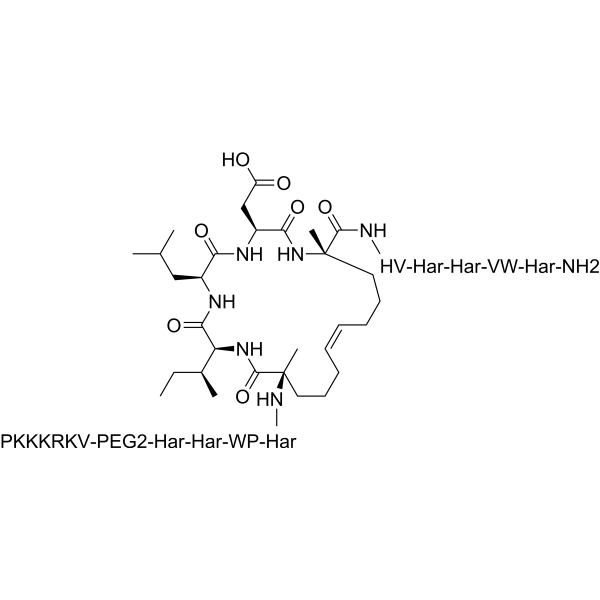
-
- HY-12762
-
QS11
1 Publications Verification
|
Others
|
Cancer
|
|
QS11 is an inhibitor of ARFGAP1 (ADP-ribosylation factor GTPase-activating protein 1), with an EC50 of 1.5 µM. QS11 modulates Wnt/β-catenin signaling through an effect on protein trafficking. QS11 inhibits migration of ARFGAP overexpressing breast cancer cells .
|
-
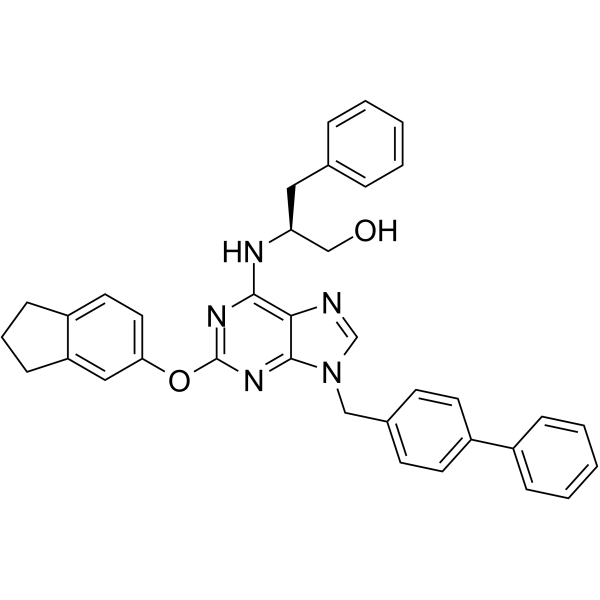
-
- HY-N3149A
-
|
|
Wnt
β-catenin
STAT
Apoptosis
|
Inflammation/Immunology
|
|
2-Hydroxycinnamaldehyde is a phenylpropanoid that can be isolated from the bark of Cinnamomum cassia. 2-Hydroxycinnamaldehyde inhibits Wnt/β-catenin, STAT3 signaling. 2-Hydroxycinnamaldehyde induces cell apoptosis 2-Hydroxycinnamaldehyde has antitumor and anti-inflammation activities .
|
-
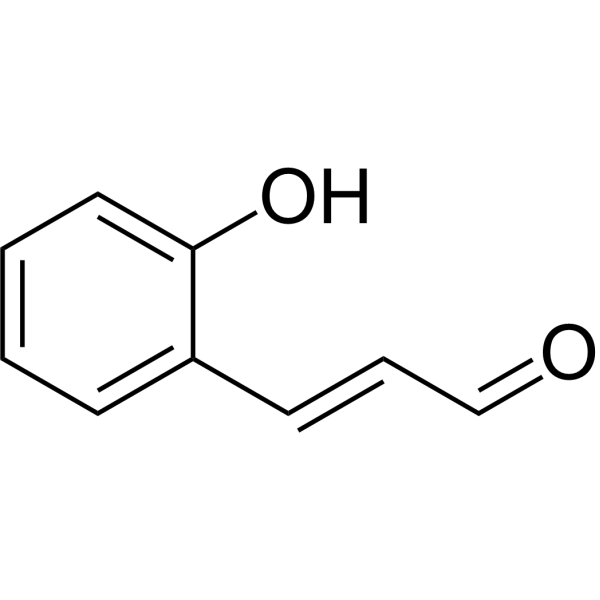
-
- HY-P2272A
-
|
|
Wnt
β-catenin
|
Cancer
|
|
NLS-StAx-h TFA is a selective, cell permeable, stapled peptide Wnt signaling inhibitor with an IC50 of 1.4 μM. NLS-StAx-h TFA efficiently inhibits β-catenin-transcription factor interactions. NLS-StAx-h TFA shows anti-proliferation of cancer cells .
|
-
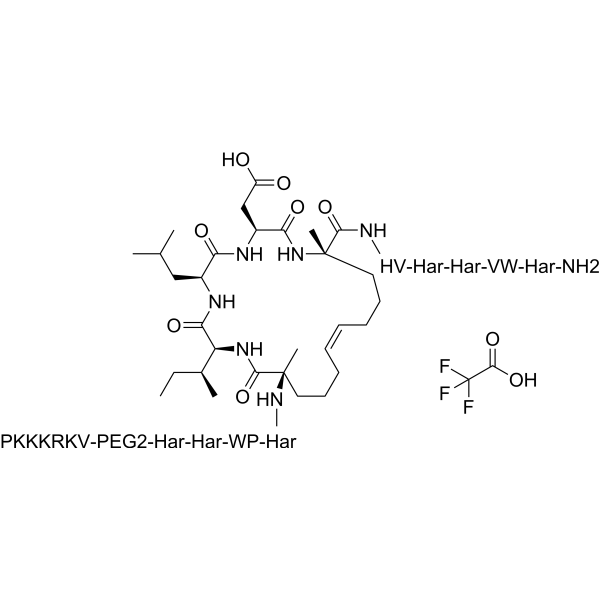
-
- HY-N0279
-
-
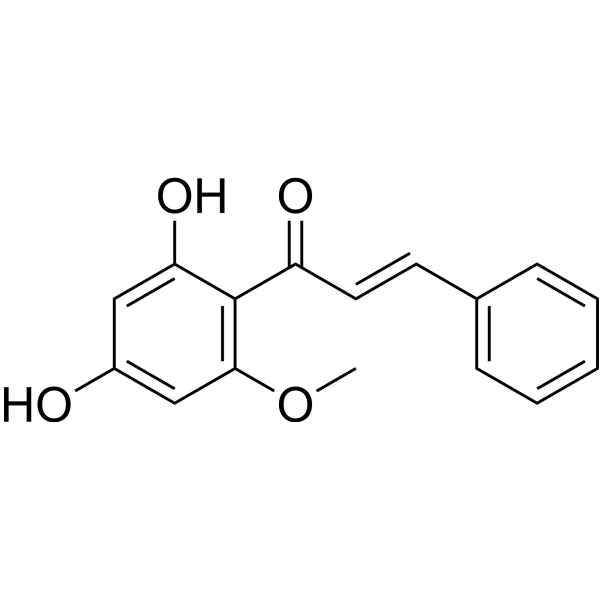
-
- HY-14930A
-
-
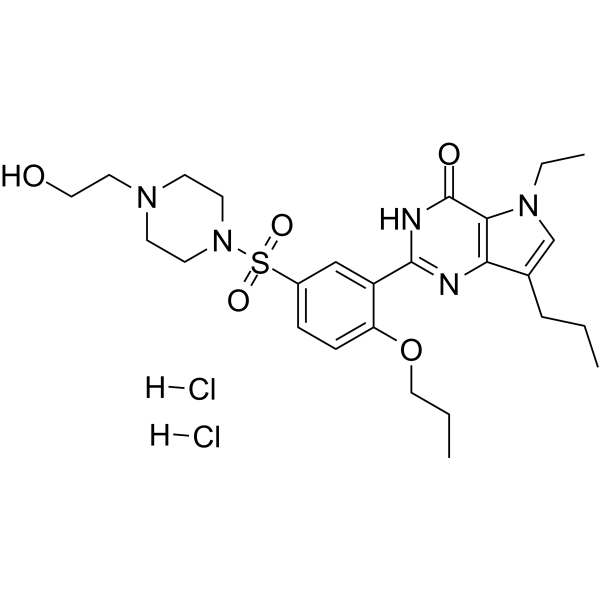
-
- HY-14930
-
-
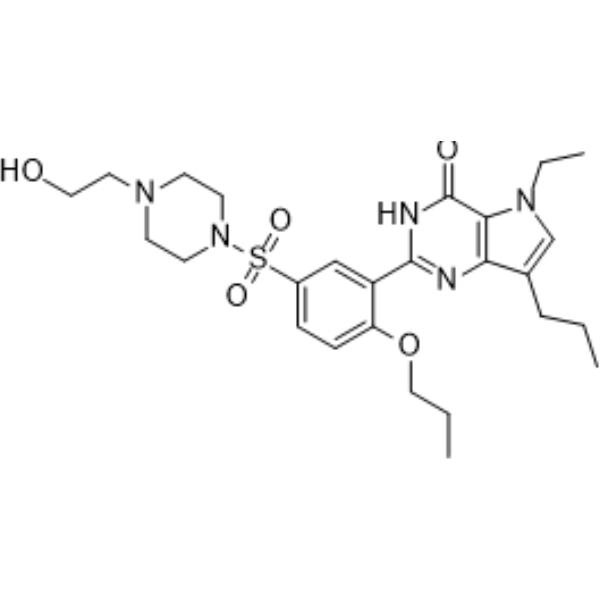
-
- HY-N0665
-
|
(8E)-Nuezhenide
|
NF-κB
Wnt
|
Inflammation/Immunology
|
|
Specnuezhenide ((8E)-Nuezhenide) is isolated from the fruits of Ligustrum lucidum. Specnuezhenide ((8E)-Nuezhenide) can inhibit IL-1β-induced inflammation in chondrocytes via inhibition of NF-κB and wnt/β-catenin signaling. Specnuezhenide ((8E)-Nuezhenide) exerts anti-inflammatory effects in a rat model of osteoarthritis (OA) .
|
-
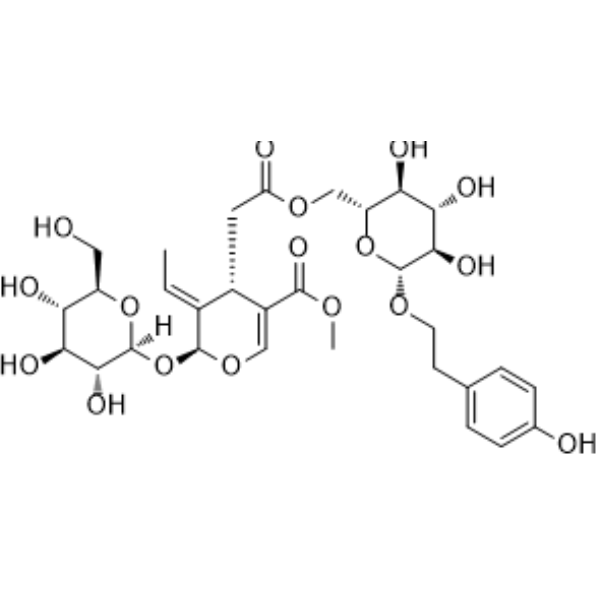
-
- HY-10456
-
|
|
p38 MAPK
Casein Kinase
|
Inflammation/Immunology
|
|
TAK-715 is an orally active and potent p38 MAPK inhibitor with IC50s of 7.1 nM, 200 nM for p38α and p38β, respectively. TAK-715 inhibits casein kinase I (CK1δ/ε) to regulate activation of Wnt/β-catenin signaling. TAK-715 shows good significant efficacy in a rat arthritis model .
|
-
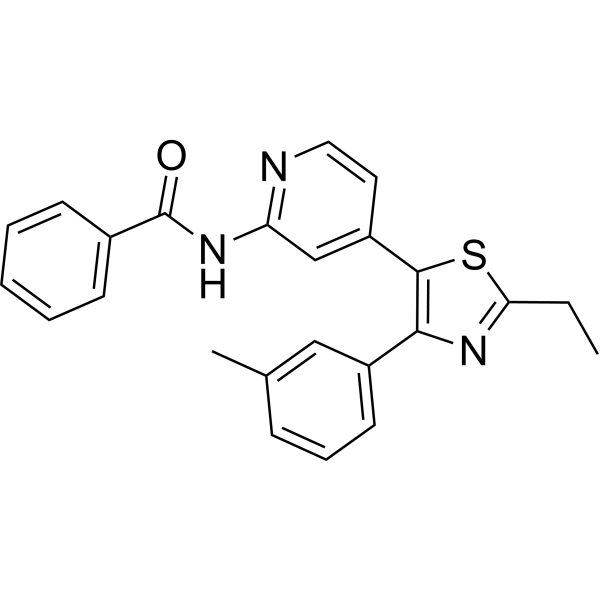
-
- HY-131447
-
KY19382
1 Publications Verification
A3051
|
GSK-3
Wnt
β-catenin
|
Metabolic Disease
|
|
KY19382 is a potent and orally active dual inhibitor of CXXC5-DVL and GSK3β, with IC50s of 19 and 10 nM, respectively. KY19382 activates Wnt/β-catenin signaling through inhibitory effects on both CXXC5-DVL interaction and GSK3β activity. KY19382 can be used for the research of high fat diet (HFD) induced metabolic diseases .
|
-
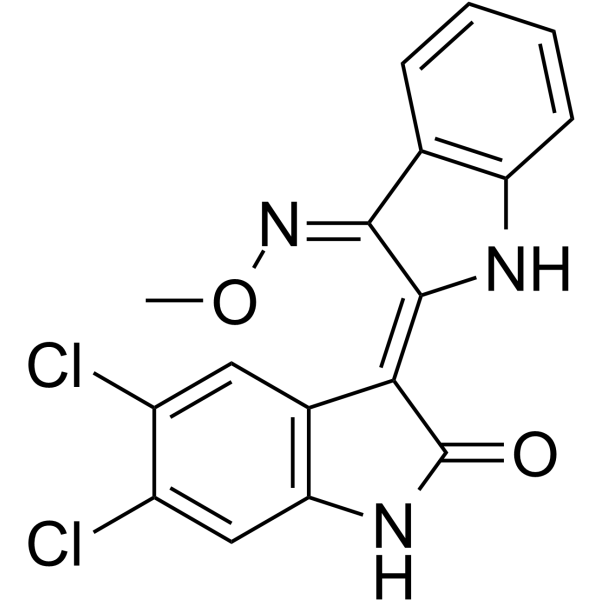
-
- HY-145669
-
DIF-3
1 Publications Verification
|
CDK
GSK-3
|
Cancer
|
|
DIF-3 reduces the expression levels of cyclin D1 and c-Myc by facilitating their degradation via activation of GSK-3β. DIF-3 inhibits Wnt/β-catenin signaling pathway-related proteins in DLD-1 cells. DIF-3 exerts a strong antiproliferative effect on the human cervical cancer cell line HeLa by inducing cyclin D1 degradation and inhibiting cyclin D1 mRNA expression .
|
-
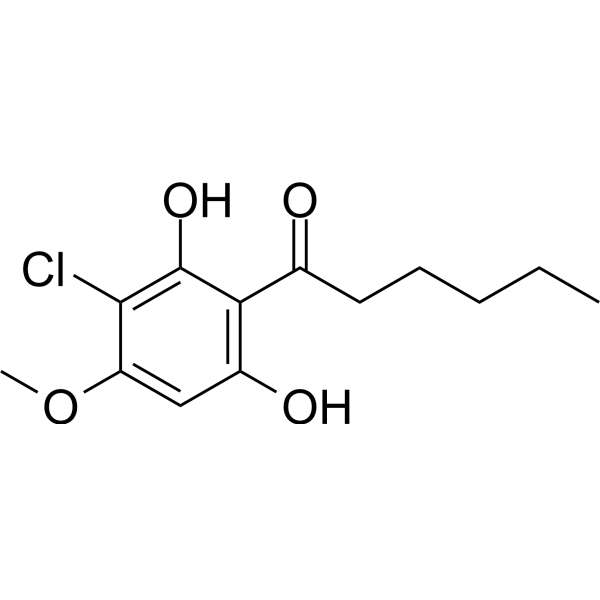
-
- HY-10182
-
Laduviglusib
Maximum Cited Publications
141 Publications Verification
CHIR-99021; CT99021
|
Organoid
GSK-3
Wnt
β-catenin
Autophagy
|
Metabolic Disease
Cancer
|
|
Laduviglusib (CHIR-99021) is a potent, selective and orally active GSK-3α/β inhibitor with IC50s of 10 nM and 6.7 nM. Laduviglusib shows >500-fold selectivity for GSK-3 over CDC2, ERK2 and other protein kinases. Laduviglusib is also a potent Wnt/β-catenin signaling pathway activator. Laduviglusib enhances mouse and human embryonic stem cells self-renewal. Laduviglusib induces autophagy .
|
-
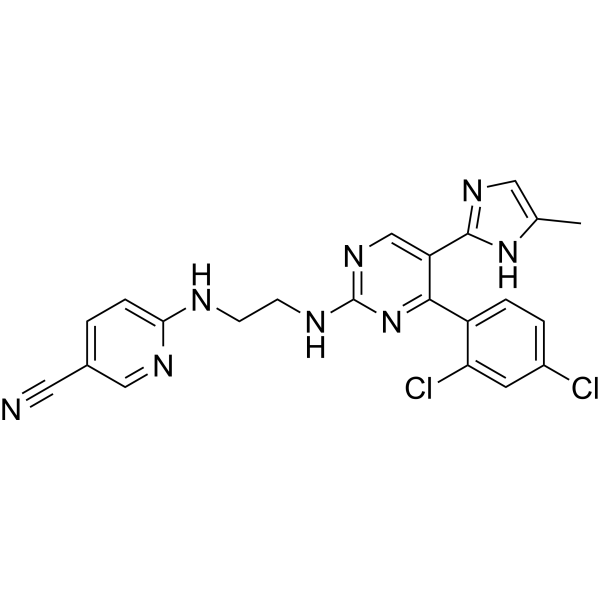
-
- HY-10182B
-
|
CHIR-99021 trihydrochloride; CT99021 trihydrochloride
|
Organoid
GSK-3
Wnt
β-catenin
Autophagy
|
Cancer
|
|
Laduviglusib (CHIR-99021) trihydrochloride is a potent and selective GSK-3α/β inhibitor with IC50s of 10 nM and 6.7 nM. Laduviglusib trihydrochloride shows >500-fold selectivity for GSK-3 over CDC2, ERK2 and other protein kinases. Laduviglusib trihydrochloride is also a potent Wnt/β-catenin signaling pathway activator. Laduviglusib trihydrochloride enhances mouse and human embryonic stem cells self-renewal. Laduviglusib trihydrochloride induces autophagy .
|
-
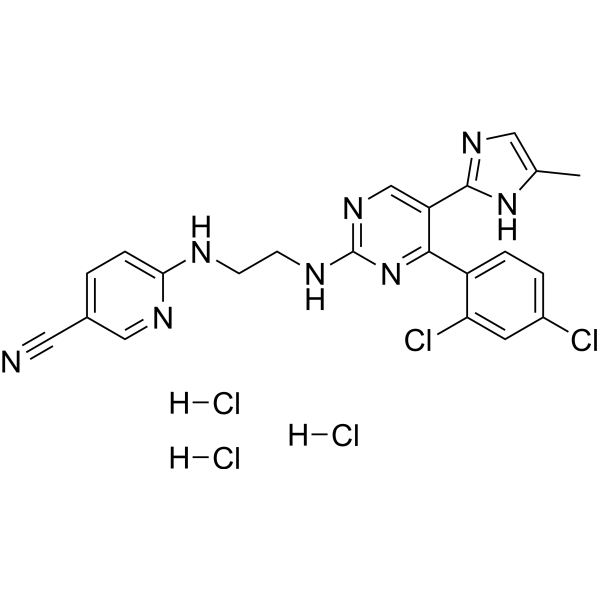
-
- HY-10182A
-
|
CHIR-99021 monohydrochloride; CT99021 monohydrochloride
|
Organoid
GSK-3
Wnt
β-catenin
Autophagy
|
Cancer
|
|
Laduviglusib (CHIR-99021) monohydrochloride is a potent and selective GSK-3α/β inhibitor with IC50s of 10 nM and 6.7 nM. Laduviglusib monohydrochloride shows >500-fold selectivity for GSK-3 over CDC2, ERK2 and other protein kinases. Laduviglusib monohydrochloride is also a potent Wnt/β-catenin signaling pathway activator. Laduviglusib monohydrochloride enhances mouse and human embryonic stem cells self-renewal. Laduviglusib monohydrochloride induces autophagy .
|
-
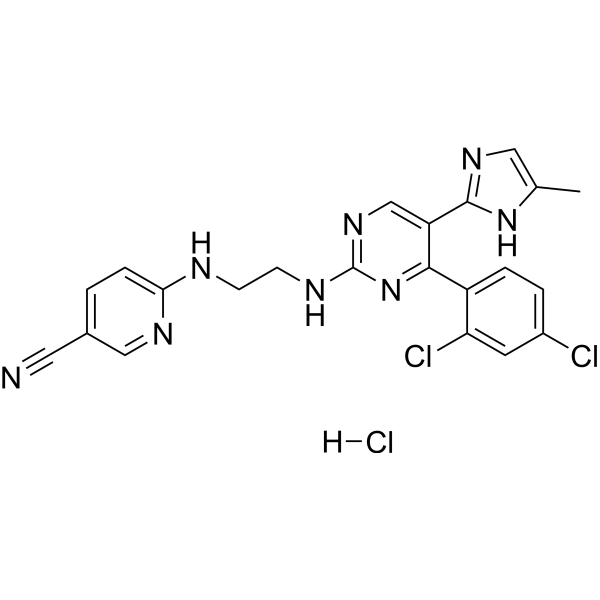
-
- HY-139254
-
|
IDR3O; I3O
|
CDK
GSK-3
JNK
|
Neurological Disease
|
|
Indirubin-3′-oxime (IDR3O), a synthetic derivative of indirubin, is a potent inhibitor of cyclin-dependent kinases (CDKs) and glycogen synthase kinase 3β (GSK3β). Indirubin-3′-oxime directly inhibits the activity of all three isoforms of JNK (JNK1, JNK2, and JNK3), with IC50s of 0.8 μM, 1.4 μM, and 1.0 μM, respectively. Indirubin-3′-oxime can enhance height growth via activation of Wnt/β-catenin signaling in chondrocytes .
|
-
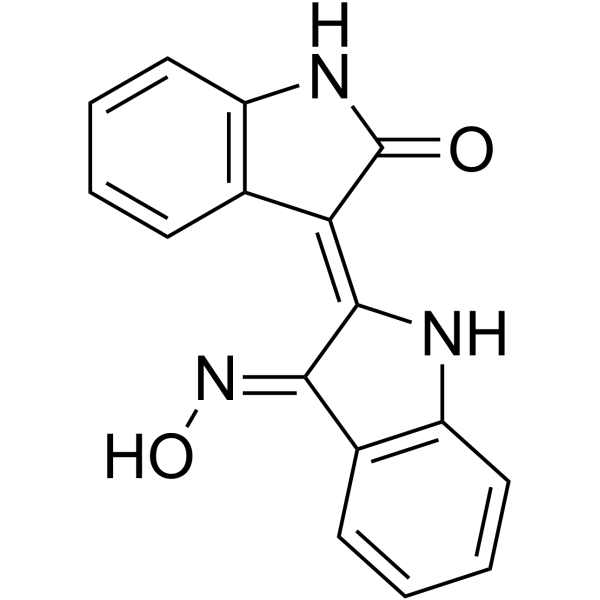
| Cat. No. |
Product Name |
Target |
Research Area |
-
- HY-P2272A
-
|
|
Wnt
β-catenin
|
Cancer
|
|
NLS-StAx-h TFA is a selective, cell permeable, stapled peptide Wnt signaling inhibitor with an IC50 of 1.4 μM. NLS-StAx-h TFA efficiently inhibits β-catenin-transcription factor interactions. NLS-StAx-h TFA shows anti-proliferation of cancer cells .
|
-
- HY-P2272
-
|
|
Wnt
β-catenin
|
Cancer
|
|
NLS-StAx-h is a selective, cell permeable, stapled peptide Wnt signaling inhibitor with an IC50 of 1.4 μM. NLS-StAx-h efficiently inhibits β-catenin-transcription factor interactions. NLS-StAx-h shows anti-proliferation of cancer cells .
|
| Cat. No. |
Product Name |
Category |
Target |
Chemical Structure |
Your information is safe with us. * Required Fields.
Inquiry Information
- Product Name:
- Cat. No.:
- Quantity:
- MCE Japan Authorized Agent:

























































